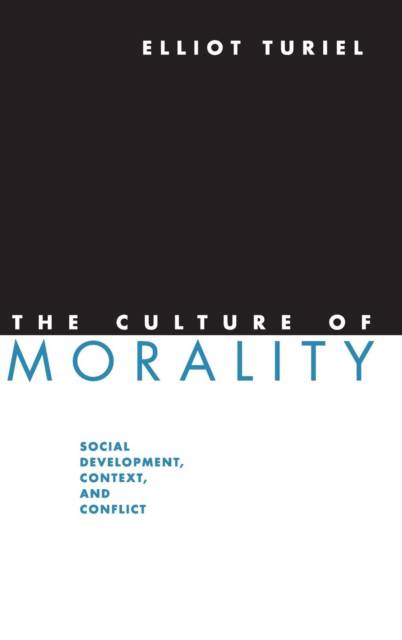
En raison d'une grêve chez bpost, votre commande pourrait être retardée. Vous avez besoin d’un livre rapidement ? Nos magasins vous accueillent à bras ouverts !
- Retrait gratuit dans votre magasin Club
- 7.000.000 titres dans notre catalogue
- Payer en toute sécurité
- Toujours un magasin près de chez vous
En raison de la grêve chez bpost, votre commande pourrait être retardée. Vous avez besoin d’un livre rapidement ? Nos magasins vous accueillent à bras ouverts !
- Retrait gratuit dans votre magasin Club
- 7.000.0000 titres dans notre catalogue
- Payer en toute sécurité
- Toujours un magasin près de chez vous
The Culture of Morality
Social Development, Context, and Conflict
Elliot Turiel
Livre relié | Anglais
72,45 €
+ 144 points
Format
Description
The Culture of Morality examines how explanations of social and moral development inform our understandings of morality and culture. A common theme in the latter part of the twentieth century has been to lament the moral state of American society and the decline of morality among youth. A sharp turn toward an extreme form of individualism and a lack of concern for community involvement and civic participation are often blamed for the moral crisis. Elliot Turiel challenges these views, drawing on a large body of research from developmental psychology, as well as from anthropology and sociology. He also culls from social events, political movements, and journalistic accounts of social and political struggles in many places of the world. Turiel shows that generation after generation has lamented the decline of society and blamed young people. Using historical accounts, he persuasively argues that such characterizations of moral decline entail stereotyping, nostalgia for times past, and a failure to recognize the moral viewpoint of those who challenge traditions. He also argues that people's discontents with the unfairness of many aspects of societal arrangements, traditions, and established practices are often misinterpreted as a lack of commitment to society or community. Going beyond American society, Turiel's penetrating analysis uses examples of social events, political movements, and journalistic accounts of social and political struggles worldwide. He shows how marginalized populations often oppose cultural arrangements, and mobilize to change the societal status quo. This unique study is a thoughtful integration of extensive research; an original approach to moral development, social justice, and culture. Elliot Turiel is Chancellor's Professor in the School of Education and Affiliate in the Department of Psychology at the University of California, Berkeley. He has been a Guggenheim Fellow, a Fellow of the National Institute of Mental Health, and a Van Leer Fellow. He is the President of the Jean Piaget Society. Turiel's previous book is The Development of Social Knowledge (Cambridge, 1983), and he has edited or co-edited Culture, Thought and Development (Erlbaum, 2000), Values and Knowledge (Erlbaum, 1997), and Development and Cultural Change (Jossey-Bass, 1999). Within the field of psychology, Turiel is considered one of the leading researchers of moral and social development. His work has served to provide new directions for a number of now-prominent researchers.
Spécifications
Parties prenantes
- Auteur(s) :
- Editeur:
Contenu
- Nombre de pages :
- 336
- Langue:
- Anglais
Caractéristiques
- EAN:
- 9780521808330
- Date de parution :
- 08-04-02
- Format:
- Livre relié
- Format numérique:
- Genaaid
- Dimensions :
- 162 mm x 236 mm
- Poids :
- 594 g

Les avis
Nous publions uniquement les avis qui respectent les conditions requises. Consultez nos conditions pour les avis.






